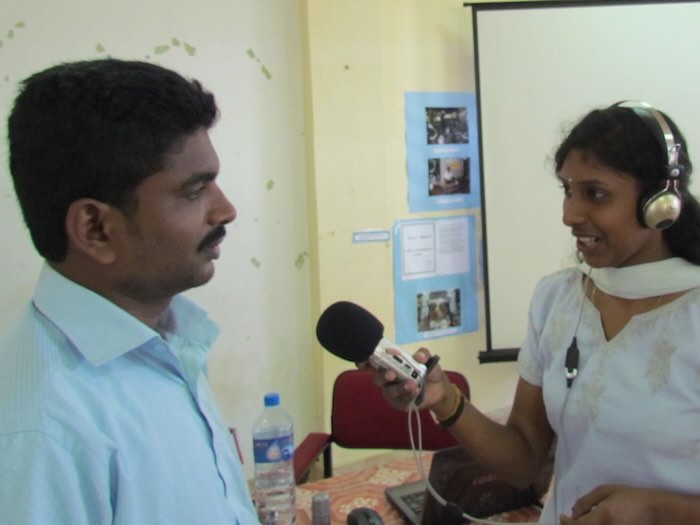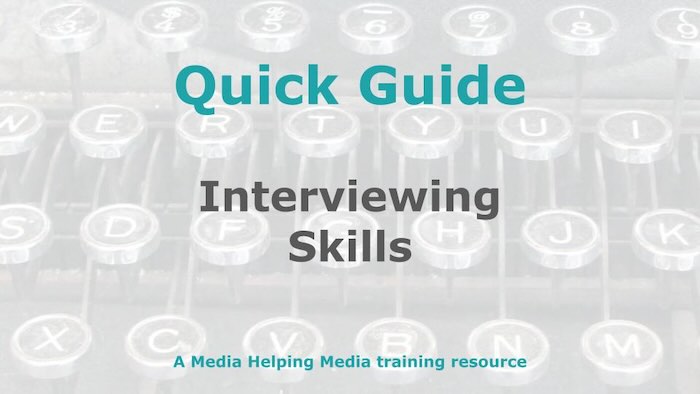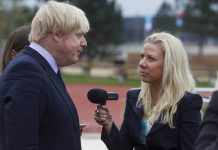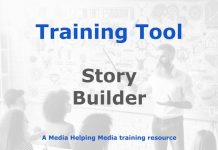
The interview is one of the basic tools of journalism. You cannot be a good journalist without being a good interviewer and a careful listener.
Interviews are used to gather facts, insights or opinions. A secondary purpose is to develop contacts and sources by demonstrating your thorough professionalism to the interviewee. If they feel you have dealt with them fairly, they will be more likely to agree to talk to you again in future.
Some interviews are brief conversations, others are long, complex interactions with your
interviewee.
With some interviews, the identity of the interviewee is not important, for example when you are interviewing a court clerk to collect details of the court’s decisions that day, or a hospital spokesperson about the number of casualties from a major incident.
In other cases, the purpose of the interview is to allow the interviewee’s own words to go on the record, for example when you are interviewing a politician, an expert or a survivor of a traumatic event.
Types of interviews
- Breaking news: Most of the interviews you do when covering breaking news stories will be simple fact-finding conversations. You will often carry out these interviews under time pressure working quickly to gather basic facts with basic questions such as who, why, where, what, when and how.
- Adversarial: One of the main purposes of public service journalism is to hold the powerful to account. When interviewing a powerful person the objective is to challenge them: to test their record, look for inconsistencies, holes in their logic, errors, uncertainties and other areas of weakness. The questioning should be polite but penetrating.
- Elucidatory: Sometimes you need to explain a complex issue to your audience and you need the help of an expert. In this case your task is simply to encourage the expert to come out with all the facts that your audience would want to hear. Your tone should be friendly and interested in the detail.
- Sensitive: There are many times when a journalist will need to interview someone who has undergone a traumatic or difficult or embarrassing experience. The interviewer must find a way to establish rapport with the interviewee, to demonstrate empathy and sensitivity while probing gently for information, insights and reaction.
- Collaborative: This is when the interviewer and interviewee have some shared interest or involvement in the subject under discussion. For example, they might both be former America correspondents with knowledge of a new development there, or they might both be friends of someone prominent who has died.
- Celebrity: This type of interview can attract audience interest, which in turn can lead them on to your other, more significant editorial content. The objective, from an interviewer’s point of view, is to help the audience feel they know the celebrity better. So you are looking for insights into the person’s history, formative experiences, motivations, successes and failures – anything that your audience can relate to personally.
- Promotional: These happen when someone has a film, a book, a TV series or something else they want to publicise. They make themselves available to a very wide range of media for interviews. The task is to find a legitimate news angle for your interview and also to come up with something none of the other media has found.
- Vox pop: These are the interviews carried out in public places with random passers by. The purpose is to gauge public opinion quickly on a specific issue or event. The material is often used in news packages to reflect diverse or contrasting views. These interviews are brief and informal. It’s important for the journalist to try to include a diverse range of voices.
- Email: Used when real-time conversation isn’t possible or preferred. Often employed in international reporting or where subjects refuse face-to-face interviews, perhaps because they want more control. Such interviews allow for more considered responses but are less spontaneous and offer limited follow-up.
- Hostile: Interviewing individuals or groups with potentially dangerous or inflammatory views. Often includes those with extreme views, those spreading disinformation, or convicted individuals. Requires strong ethical framing, disclaimers, and skilled moderation to avoid causing offence and other forms of harm.
Interviewing essentials
Whatever the form there are some important points that apply to all interview types:
- Accuracy – everything you do and say must be correct.
- Impartiality – do not take sides; guard against your own conscious and unconscious biases.
- Fairness – treat everybody the same and be generous and reasonable in any judgements you are tempted to make.
- Research – Be well-prepared. Know the subject matter and have a list of questions ready to ensure you cover all the main points of interest.
- Listen – Don’t ignore the answers. Listen carefully. Be agile and ready to depart from your list of questions and respond to what your interviewee is saying if the conversation takes an unexpected turn.
- Sound interested – be professional and engaging. Inject vitality into your presentation to stimulate the interviewee and your audience.
Interviewing tips
Always keep in mind that the interview is not about you. You are not asking questions for your own sake. You are asking the questions that you believe your audience would like to be answered.
- Don’t show off or try to upstage your interviewee.
- Keep the questions short. It’s the answers that are important. You should be as brief and unobtrusive as possible.
- Be polite and respectful – especially when you are challenging your interviewee about something.
- Be persistent where necessary – politicians in particular are skilled at evading questions. Pursue your line of questioning until it becomes clear to you and your audience that no answer is going to follow. See ‘How to interview politicians.
- Stay in control of the conversation – keep in mind where you want the conversation to go and keep it on track.
- No advance notice – resist any requests by the interviewee or their representative to see the questions in advance.
- Transparency – be clear with everyone about who you are, where and when the interview will be published and what rules or conventions you intend to follow
Summary
Interviewing is an art. It is a mix of technical and personal skills, experience and devotion to standards of accuracy, impartiality and ethics. All these things combine to produce interviews that are informative, engaging and trustworthy.









